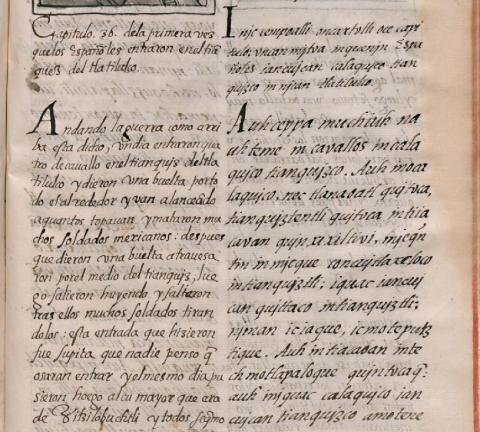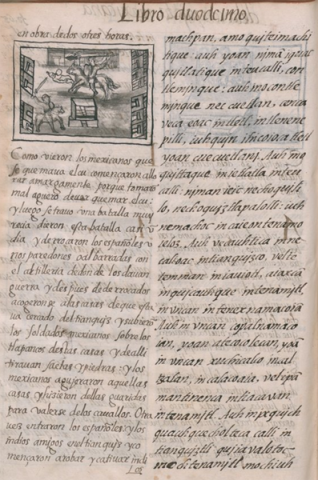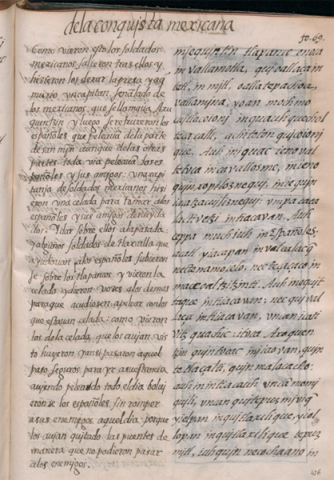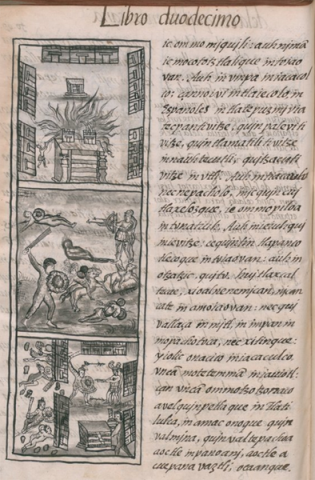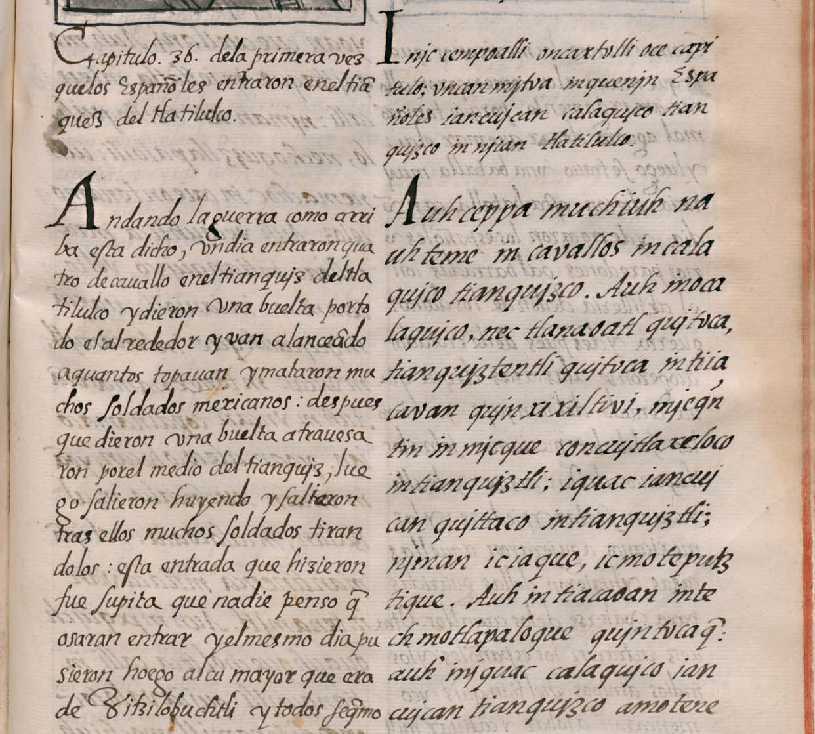 |
[Transcription of the Nahuatl (right-hand column) by James Lockhart:]
[f. 68r., cont.] Inic cempoalli oncaxtolli oce capitulo: vncan mitoa in quenin Españoles iancuican calaquico tianquizco in nican tlatilulco.
Auh ceppa muchiuh nauhteme in cavallos in calaquico tianquizco. Auh in ocalaquico, nec tlanaoatl quitoca, tianquiztentli quitoca in tiiacavan quinxixiltivi, mieq̄ntin in micque concuitlaxeloco in tianquiztli: iquac iancuican quittaco in tianquiztli: niman ic iaque, ic moteputztique. Auh in tiacaoan intech motlapaloque quintocaq̄: auh in iquac calaquico iancuican tianquizco amo tene
|
[Translation of the Nahuatl (right-hand column) by James Lockhart:]
Thirty-sixth chapter, where it is said how the Spaniards for the first time entered the marketplace here in Tlatelolco.
Once it happened that four horse[men] came and entered the marketplace. On entering they followed a circle, going around the edge of the marketplace. They went lancing the warriors, and many died. They came penetrating into the midst of the marketplace. That was the first time they saw it; then they turned around and went away. And the warriors were daring with them; they pursued them. And when they came into the marketplace for the first time, no one expected it,
[Translation of the Spanish (left-hand column) by James Lockhart:]
Chapter Thirty-six, of the first time the Spaniards entered the tiánquiz of Tlatclolco.
With the war going as said above, one day four horsemen entered the tiánquiz of Tlatelolco and took a turn all around it, lancing everyone they came upon, and they killed many Mexica soldiers. After going around once, they crossed the middle of the tiánquiz, then left fleeing. Many soldiers ran after them, shooting at them. This entry of theirs was unexpected, and no one thought that they would dare enter.
On the same day they set fire to the principal cu, which was Huitzilopochtli's, and it burned
|
[Translation of the Nahuatl into Spanish by Fr. Bernardino de Sahagún; transcription of the Spanish (left-hand column) by James Lockhart:]
[f. 68r., cont.] Capitulo .36. de la primera vez que Españoles entraron en el tiāquez del tlatilulco.
Andando la guerra como arriba esta dicho, vn dia entraron quatro de cauallo en el tianquiz del tlatilulco y dieron vna buelta por todo el alrededor yvan alanceādo a quantos topauan y mataron muchos soldados mexicanos: despues que dieron vna buelta atrauesaron por el medio del tianquiz, luego salieron huyendo y saltaron tras ellos muchos soldados tirandolos: esta entrada que hizieron fue supita que nadie penso q̄ osaron entrar
y el mesmo dia pusieron hoego al cu mayor que era de Vitzilobuchtli y todos se q̄mo
|
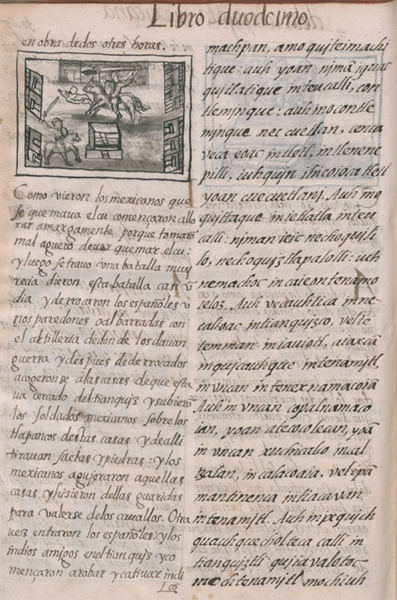 |
[Transcription of the Nahuatl (right-hand column) by James Lockhart:]
[f. 68v.] machpan, amo quiteimachitique:
auh yoan nimā iquac quitlatique in teucalli, contleminque: auh in ocontleminque nec cuetlan, cenca veca eoac in tletl, in tlenenepilli, iuhquin ihicoioca tletl yoan cuecuetlani. Auh in oquittaque in ie tlatla in teucalli: niman ie ic nechoquililo, nechoquiztlapalolli: iuh nemachoc in ca ie ontenamoieloz.
Auh vecauhtica in necalioac in tianquizco, vel tetemman in iauiotl, aiaxcā in quicauhque in tenamitl, in vncan in tenexnamacoiā Auh in vncan copalnamacoian, yoan atecocolecan, yoā in vncan xuchicalco in caltzalan, in calacoaia, vel ipā mantinenca in tiacavan in tenamitl. Auh in ixquich quauhquecholtecacalli in tianquiztli quiiavalotoc moch tenamitl mochiuh
|
[Translation of the Nahuatl (right-hand column) by James Lockhart:]
they gave no sign of it.
And then was also when they burned the temple, setting fire to it. When they had set it on fire, it flared up; the tongues of flame rose very high, and the fire seemed to crackle and roar. And when they saw the temple burning, there was weeping and people greeted each other tearfully; it was thought that plundering was to begin.
Fighting went on for a long time in the marketplace; it was full of combat. It was a long time before they abandoned the walls at Tenexnamacoyan, Copalnamacoyan, and Atecocolecan. And at Xochicalco, where <the Spaniards> were entering the passageways, the warriors went about on the walls everywhere. And all the houses of the Quauhquechollan people that surrounded the marketplace became a rampart.
[Translation of the Spanish (left-hand column) by James Lockhart:]
completely in about two or three hours. When the Mexica saw the cu burning, they began to weep bitterly, because they took it for a bad omen to sec the cu burned.
Then there was a very fierce battle lasting almost a day. With the artillery the Spaniards demolished some large walls or barricades from where they were giving them battle. After they were demolished, they took refuge in the houses surrounding the tiánquiz. The Mexica soldiers climbed up on the tlapancos of these houses and from there shot arrows and threw stones; and the Mexica made holes in those houses [to shoot from], using them as shelters to protect them from the horses.
Another time the Spaniards and the Indian friends came into the tiánquiz and began to abduct and capture Indians.
|
[Translation of the Nahuatl into Spanish by Fr. Bernardino de Sahagún; transcription of the Spanish (left-hand column) by James Lockhart:]
[f. 68v.] en obra de dos o tres horas.
Como vieron los mexicanos que se quemaua el cu començaron a llorar amargamente porque tomarō mal aguero de uer quemar el cu:
y luego se trauo vna batalla muy recia dieron esta batalla casi v̄ dia y derrocaron los españoles vnos paredones o albarradas con el artilleria de donde los dauan guerra y despues de derrocados acogeronse a las casas de que estaua cercado del tianquiz y subierō los soldados mexicanos sobre los tlapancos destas casas y de alli tirauan saetas y piedras: y los mexicanos agujeraron aquellas casas y hizieron dellas guaridas para valerse de los cauallos.
Otra uez entraron los españoles: y los indios amigos en el tianquiz y començaron a robar y catiuar indios
|
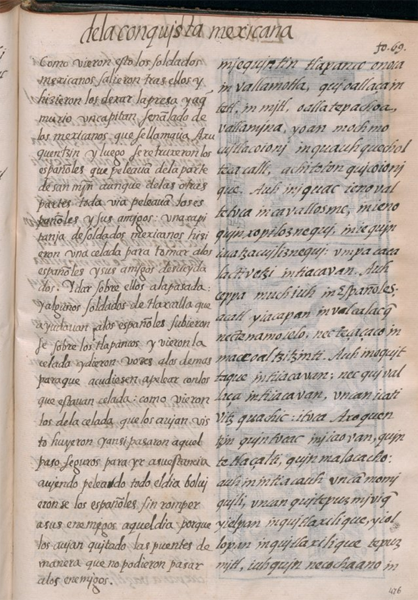 |
[Transcription of the Nahuatl (right-hand column) by James Lockhart:]
[f. 69r.] miequintin tlapanco onoca in vallamotla, quioallaça in tetl, in mitl, oallatepachoa, vallamina, yoan moch mocuitlacoioni in quauhquecholtecacalli, achitoton quicoionique. Auh in iquac ie no valtetoca in cavallosme, in ie no quinxopiloznequi, in ie quiniacatzacuiliznequi: vmpa cacalacti vetzi in tiacavan.
Auh ceppa muchiuh in Españoles: acatl yiacapan in valcalacq̄ nec tenamoielo, nec teçaçaco in maceoaltzitzinti. Auh in oquittaque in tiiacavan: nec quivallaça in tiiacavan, vncan icativitz quachic: itoca Axoquentzin quintocac in iiaovan, quintetlaçalti, quinmalacacho: auh inin tiacauh vncā momiquili, vncan quitepuzmiviq̄ yielpan, in quitlaxilique, yiollopan in quitlaxilique tepuzmitl, iuhquin necochaano in
|
[Translation of the Nahuatl (right-hand column) by James Lockhart:]
Many [warriors] who were on the roofs hurled down stones and arrows, stoning and shooting arrows from there, and they made holes in all the houses of the Quauhquechollan people, breaking out little holes. And when the horse[men] were pursuing people and trying <to trample them> and cut them off, the warriors quickly went in there.
Once it happened that the Spaniards came into Acatliyacapan; then people were snatched, the poor commoners were taken away. When the warriors saw it, they let loose against them. Coming among the warriors was a scraped-head named Axoquentzin. He pursued his enemies; he made them let people go, he spun them about. But this warrior died there; they hit him with an iron bolt in the chest, they shot an iron bolt into his heart. He died as if he were stretching out when going to sleep.
[Translation of the Spanish (left-hand column) by James Lockhart:]
When the Mexica soldiers saw this, they went out after them and made them abandon their prey. Here an outstanding captain of the Mexica, called Axoquentzin, died. Then the Spaniards who were in the battle in the direction of San Martin withdrew, though on other sides the Spaniards and their friends continued to fight.
A company of Mexica soldiers set up an ambush to take the Spaniards and their friends by surprise and leap upon them as they passed by, but some soldiers from Tlaxcala who were helping the Spaniards climbed up on the tlapancos and saw the ambush. They shouted to the rest to come and do battle with those who were in the ambush. When those in the ambush saw that they had been seen, they fled, and thus they safely passed that narrow place on the way to their quarters.
Having fought all day, the Spaniards went back without having routed their enemies that day, because they had removed the bridges so that they could not get at the enemy.
|
[Translation of the Nahuatl into Spanish by Fr. Bernardino de Sahagún; transcription of the Spanish (left-hand column) by James Lockhart:]
[f. 69r.] Como vieron esto los soldados mexicanos salieron tras ellos y hizieronlos dexar la presa y aq̓ murio vn capitan señalado de los mexicanos que se llamaua Axuquentzin y luego se retruxeron los españoles que peleauā de la parte de san m̄īn aunque de las otras partes todavia peleauā los españoles y sus amigos:
vna capitania de mexicanos hizieron vna celada para tomar a los españoles y sus amigos descuydados. Y dar sobre ellos a la pasada: y algunos soldados de Tlaxcalla que ayudauan a los españoles subieronse sobre los tlapancos y vieron la celada y dieron vozes a los demas para que acudiesen a pelear con los que estauan celada:* como vieron los de la celada que los auian visto huyeron y ansi pasaron aquel paso seguros para yr a su estancia
auiendo peleado todo el dia boluieronse los españoles sin romper a sus enemigos aquel dia porque los auian quitado las puentes de manera que no podieron pasar a los enemigos.
----------
*CELADA. In normal usage, something on the order of "en" should precede this word.
|
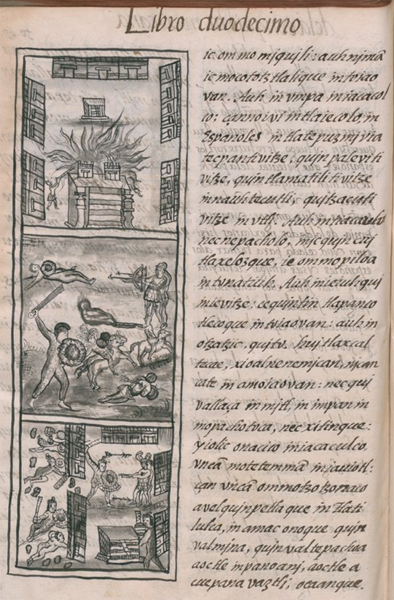 |
[Transcription of the Nahuatl (right-hand column) by James Lockhart:]
[f. 69v.] ]ic ommomiquili: auh nimā ic mocototztlalique in toiaovan.
Auh in vmpa in iacacolco: çanno ivi in tlaiecolo, in Espanoles in tlatepuzmivia tecpantivitze, quinpalevitivitze, quintlamatilitivitze in nauhtecutli, quitzacutivitze in vtli. Auh in tiacavan nec nepacholo, inic quincuitla xelozque, ie ommopiloa in tonatiuh. Auh in ie iuhqui in ie vitze: cequintin tlapanco tlecoque in toiaovan: auh in otzatzic, quito. hui tlaxcaltecae, xioalnenemican, nican cate in amoiaovan: nec quivallaça in mitl, in impan in mopachotoca, nec xitinque:
yiolic onacico in iacaculco vncā motetemmā in iauiotl: çan vncā ommotzotzonaco avel quinpetlaque in Tlatilulca, in amac onoque quinvalmina, quinvaltepachoa aoctle in panoani, aoctle acuepanavaztli, ocaanque.
|
[Translation of the Nahuatl (right-hand column) by James Lockhart:]
Then our enemies retired.
And at Yacacolco likewise there was fighting. The Spaniards who shoot the iron bolts came in formation. The Four Lords came helping them, accompanying them, closing the road. And the warriors crouched down in order to penetrate into their midst. The sun was already low. And as they were just about to come [out attacking the Spaniards], some of our enemies climbed on a roof and cried out, saying, “Hey, Tlaxcalans, come running, here are your enemies!” Then they threw darts down on those who had been crouched there, and they dispersed.
Slowly [the Spaniards] reached Yacacolco; the battle was fierce there. They just hit against a wall, they could not break through the Tlatelolca. Those who were on the other side of the water shot arrows at them, threw stones at them. They were not able to cross, not able to find a way over.
[Translation of the Spanish (left-hand column) by James Lockhart:]
(intentionally blank)
|
[Translation of the Nahuatl into Spanish by Fr. Bernardino de Sahagún; transcription of the Spanish (left-hand column) by James Lockhart:]
[f. 69v., tres dibujos; sin texto en español]
|
